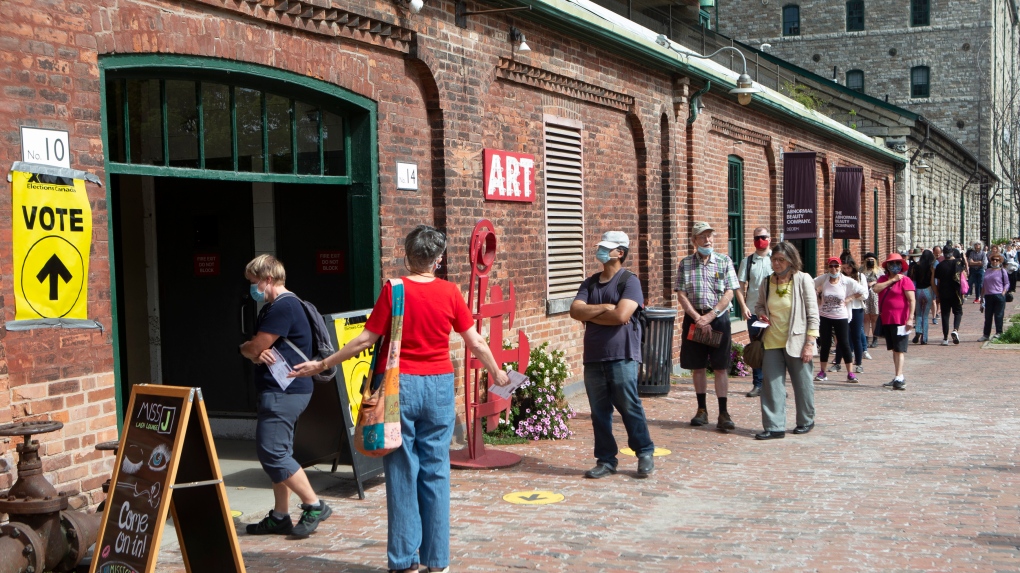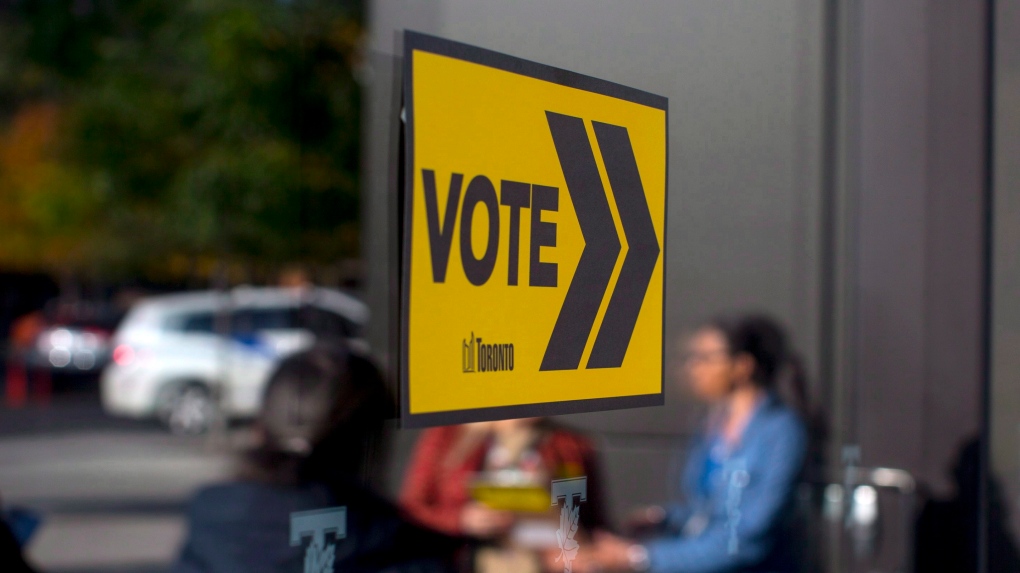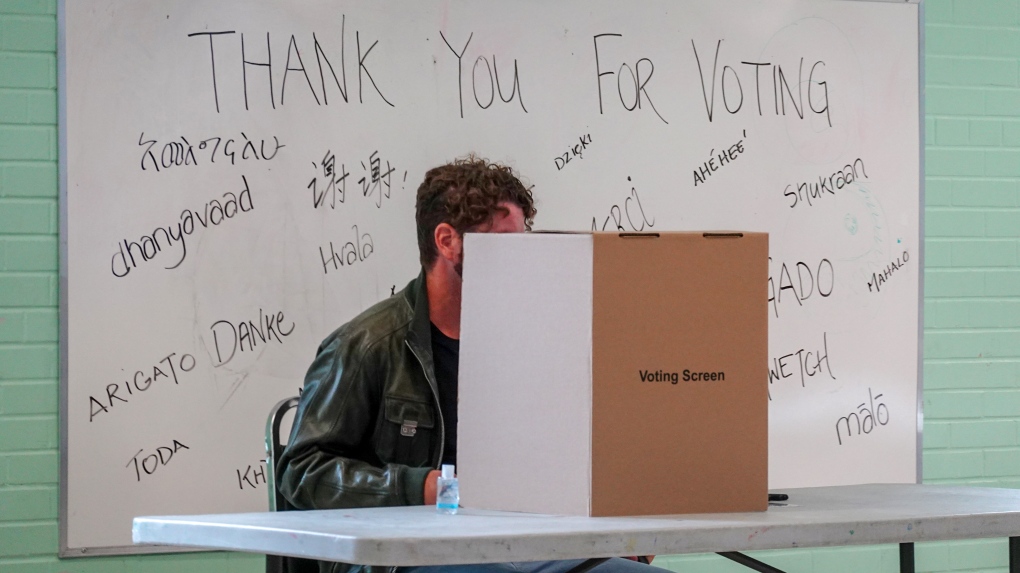How to cast your vote for Toronto's next mayor today
The 2023 election for mayor of Toronto is today.
On Monday, June 26, from 10 a.m. to 8 p.m., eligible residents can cast their votes for the candidate they want to see at the helm of Toronto.
To ease the process, CTV News Toronto has compiled some frequently asked questions on voting in Toronto.
WHO CAN VOTE IN TORONTO’S ELECTION?
In order to vote in the City of Toronto, you must be:
- A Canadian citizen; and
- At least 18 years old; and
- A resident in the city of Toronto; or
- A non-resident of Toronto, but you or your spouse own or rent property in the city; and
- Not prohibited from voting under any law
WHO IS NOT ALLOWED TO VOTE?
You are prohibited from voting if you are serving a sentence of imprisonment in a penal or correctional institution, are acting as executor or trustee except as a voting proxy, or have been convicted of a corrupt practice as outlined in the Municipal Elections Act.
HOW DO I VOTE IN THE TORONTO ELECTION?
Vote in person on election day
You can vote in person on election day at your specified voting location. If you rent or own property in the city, you must vote in your ward.
To find your correct voting location, you can use the MyVote web portal.
Curbside vote on election day
If you are physically unable to go inside the voting location, you can request to have your ballot brought to your vehicle, outside of the building or to another area within the voting location.
If you have someone accompanying you, have them alert voting officials inside the location that you require curbside assistance. If not, you can call 416-338-2020 or email AccessibleElections@toronto.ca to organize the service.
Vote by proxy
If you’re unable to vote in person during advanced voting, or on election day, you can appoint a proxy to vote for you. Your proxy must also be an eligible voter.
To get a Voting Proxy Appointment Form contact Toronto Elections by emailing voterregistration@toronto.ca or by calling 311. The form must be certified by the City Clerk, which can be done on a drop-in basis in-person at City Hall or by appointment at the North York Civic Centre. Form certification will be offered until 4 p.m. on election day at City Hall.
Advanced Voting
Advanced voting in Toronto's municipal election ran from June 8 to 13 and has now ended.
Vote by mail
You can no longer apply for mail-in voting. The deadline was May 26.
 Voters queue at a poling station to cast their ballot on Monday, September 20, 2021. THE CANADIAN PRESS/Chris Young
Voters queue at a poling station to cast their ballot on Monday, September 20, 2021. THE CANADIAN PRESS/Chris Young
WHERE DO I VOTE?
Toronto residents must vote in their ward. To find your ward number, check the city's 2023 street index. When you have your ward number, you can see the voting locations within that ward on the city's full list of voting locations by ward.
AM I ALREADY ON THE VOTERS LIST?
If you are already registered to vote in the City of Toronto, you should have received a Voter’s Information Card in the mail. This is not mandatory to vote but will speed up the process on election day, the city says.
You can find out if you are registered to vote, or already on the voter’s list by emailing VoterRegistration@toronto.ca, calling 311, or using MyVote.
You can also use MyVote to:
- Check what candidates are running in your ward.
- Find out when and where to vote.
- View, download or print your Voter’s Information Card.
You can still vote on Monday if you are not pre-registered – you will just need to register day-of. To do so, you’ll need to bring proper identification.
WHAT ID DO I BRING TO VOTE IN THE TORONTO ELECTION?
Identification is required when voting. Each voter needs to come equipped with one piece of ID showing their name and Toronto address.
Photo identification is not mandatory. Your Voter Information Card will not be accepted as identification.
Examples of acceptable voting ID include:
Government Issued – a document issued by the government of Canada or province of Ontario such as tax documents, drivers licence, photo ID card
Bank Issued – credit card statement, bank account statement, cancelled personalized cheque, loan agreement
Utility Bill – Hydro, telephone or cable TV, water, gas or a bill from a public utilities commission
Employment Issued – Cheque stub, T4 statement or pay receipt issued by an employer, statement of direct deposit from Ontario Works or Ontario Disability Support Program
If you do not have acceptable identification, you will be asked to return with an acceptable ID in order to place a vote.
WHAT HAPPENS WHEN YOU VOTE?
When you arrive, an election official will show you where you need to go, whether you need to wait in line or are able to vote without waiting first.
The official will ask for your identification and check to see if you are registered. They will show you how to mark your ballot, give you a secrecy folder to keep it in, and lead you to the voting screen.
You can mark your ballot by filling in the oval to the right of the candidate of your choice's name. You can only fill in one oval.
If you make a mistake or change your mind, take the ballot to the election official who will cancel your ballot and issue you another one.
When you've filled in the oval of the candidate you chose, you will place your marked ballot into your folder and return it to the official, who will feed it into a tabulator.
If there is a problem with your ballot, the tabulator will return it. The election official will give you the option of a new ballot or having the tabulator accept the ballot as marked. You will have successfully voted once your ballot is accepted by the tabulator.
WHO ARE THE CANDIDATES FOR TORONTO MAYOR?
There are 102 candidates registered in Toronto’s 2023 mayoral byelection.
With so many options and no incumbent, the result could be “bizarre,” Dennis M. Pilon, associate professor of political science at York University said earlier this year.
The number of votes needed to win Toronto’s June election will depend on the number of people who decide to exercise their democratic right this year.
If voter turnout remains unchanged from last year’s, a candidate would need about 140,000 votes to snag 25 per cent of the vote – or just over seven per cent of eligible voters.
If the voter turnout more closely mirrored that of 2018's, a candidate would need just under 195,000 votes to make up 25 per cent of the vote.
A candidate could win with a voter percentage as low as 20, Pilon said.
"In this case, we could end up with somebody who was elected by like a very small [group] – it's anybody's for the winning."
AM I ENTITLED TO TIME OFF WORK TO VOTE?
Yes, your employer is required to allow you three hours in which to vote on election day.
While your employer is required to make sure you have three hours to vote, they are not required to give you three hours off of work. For example, if your working hours are from 10 a.m. to 6 p.m., you are entitled to leave one hour early so that you would have from 5 p.m. to 8 p.m. to vote.
The city says your employer may decide when it would be most convenient for you to be absent in order to vote.
CAN I VOTE IN TORONTO’S ELECTION IF I’M A STUDENT?
Yes. If you are a student from another municipality living in Toronto for school, you are eligible to cast your vote for mayor.
Your address is considered to be either your current Toronto residence or, if you are temporarily without a Toronto residence, the address where you most recently lived in Toronto during your previous academic term will be accepted.
If you are from Toronto, but living elsewhere for school, you are also eligible to vote. If you are in another Ontario municipality, you may be able to vote there. The city advises checking with the municipality you attend school in to ensure you have voting options ahead of June 26. Out-of-town students can also organize a voter proxy.
 Voters line up outside a voting station to cast their ballot in the Toronto's municipal election in Toronto on Monday, October 22, 2018. THE CANADIAN PRESS/Chris Young
Voters line up outside a voting station to cast their ballot in the Toronto's municipal election in Toronto on Monday, October 22, 2018. THE CANADIAN PRESS/Chris Young
CAN I VOTE IF I DON’T HAVE A PERMANENT ADDRESS?
If you are an eligible voter, but don’t have a permanent address, you can still vote in Toronto’s 2023 election.
In lieu of identification that shows a qualifying address, the voter is asked to sign an official declaration stating they are eligible to vote and meet all other eligibility requirements.
"Toronto Elections works with shelters and drop-in centres across the city to provide them with information cards and posters that detail the closest voting locations and key information for eligible electors, who do not have a permanent address, to cast their ballot," a spokesperson told CTV News Toronto.
WHAT IF I NEED ACCOMMODATION ON TORONTO’S ELECTION DAY?
The city says all voting locations will be accessible.
Voter Assist Terminals (VATs) will be available to all. VATs are ballot-marking devices intended to allow voters with disabilities to mark their ballot privately and independently. It includes a touch screen, an audio function, a braille keypad, a sip/puff tube, a rocker paddle/foot switch and zoom features to adjust font sizes and colour contrast.
If you need to use one of these terminals on election day and one is not located at your designated voting location, call 311 and request they transfer your ballet to a voting location with proper accessibility accommodations.
Instructions on how to vote will be made available in 26 languages at each voting location and online.
If you face a barrier to voting not addressed above or on the city’s website, email elections@toronto.ca, accessibleelections@toronto.ca, or call 416-338-1111 and press 6.
 A voter is seeing casting his ballot for the 2022 Toronto municipal election. (Scott Lightfoot/CTV News)
A voter is seeing casting his ballot for the 2022 Toronto municipal election. (Scott Lightfoot/CTV News)
Correction
A previous version of this article stated voters could use the city's MyVote application to "add, change or update your voter’s list information." On Tuesday, the city clarified this is not the case and has been removed from the article.
CTVNews.ca Top Stories

Trudeau noncommittal on expanding rebate beyond 'working Canadians'
Prime Minister Justin Trudeau does not appear willing to budge on his plan to send a $250 rebate to 'hardworking Canadians,' despite pressure from the opposition to give the money to seniors and people who are not able to work.
'Mayday!': New details emerge after Boeing plane makes emergency landing at Mirabel airport
New details suggest that there were communication issues between the pilots of a charter flight and the control tower at Montreal's Mirabel airport when a Boeing 737 made an emergency landing on Wednesday.
Cucumbers sold in Ontario, other provinces recalled over possible salmonella contamination
A U.S. company is recalling cucumbers sold in Ontario and other Canadian provinces due to possible salmonella contamination.
Latest updates: Tracking RSV, influenza, COVID-19 in Canada
As the country heads into the worst time of year for respiratory infections, the Canadian respiratory virus surveillance report tracks how prevalent certain viruses are each week and how the trends are changing week to week.
Weekend weather: Parts of Canada could see up to 50 centimetres of snow, wind chills of -40
Winter is less than a month away, but parts of Canada are already projected to see winter-like weather.
W5 Investigates A 'ticking time bomb': Inside Syria's toughest prison holding accused high-ranking ISIS members
In the last of a three-part investigation, W5's Avery Haines was given rare access to a Syrian prison, where thousands of accused high-ranking ISIS members are being held.
Federal government posts $13B deficit in first half of the fiscal year
The Finance Department says the federal deficit was $13 billion between April and September.
Armed men in speedboats make off with women and children when a migrants' dinghy deflates off Libya
Armed men in two speedboats took off with women and children after a rubber dinghy carrying some 112 migrants seeking to cross the Mediterranean Sea started deflating off Libya's coast, a humanitarian aid group said Friday.
Nick Cannon says he's seeking help for narcissistic personality disorder
Nick Cannon has spoken out about his recent diagnosis of narcissistic personality disorder, saying 'I need help.'

































